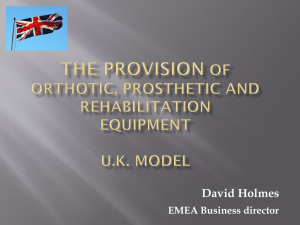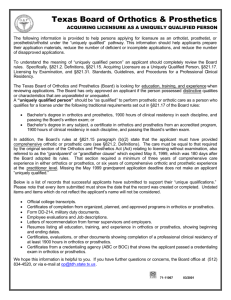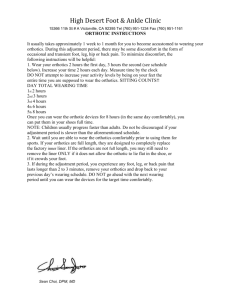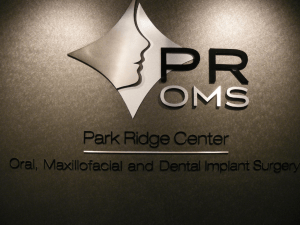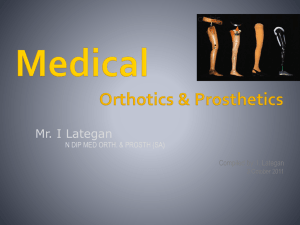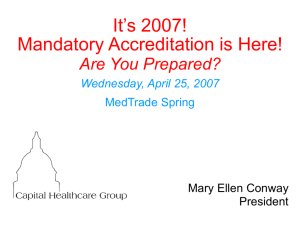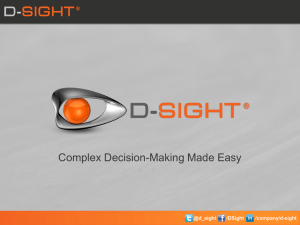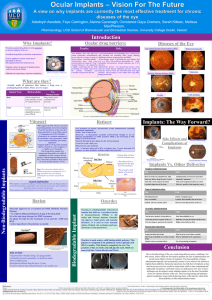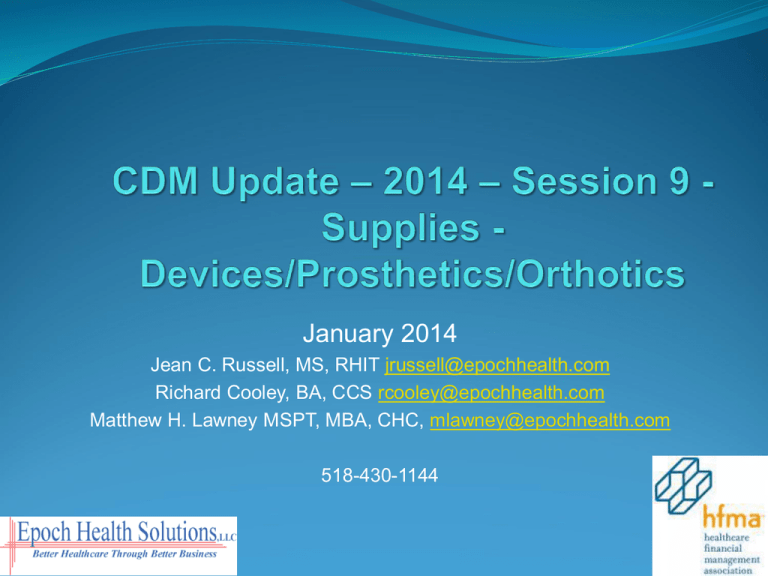
January 2014
Jean C. Russell, MS, RHIT jrussell@epochhealth.com
Richard Cooley, BA, CCS rcooley@epochhealth.com
Matthew H. Lawney MSPT, MBA, CHC, mlawney@epochhealth.com
518-430-1144
2
Agenda
•
•
•
Devices
Prosthetics and Orthotics (POS)
Supplies
3
Devices
4
Pass-through Devices
Category of devices eligible for transitional passthrough payment for at least 2 and up to 3 years
Pass-through device list updated quarterly
All of the pass-through devices for 2013 are now
packaged, one remains a status H in 2014
HCPCS Code
Short Descriptor
2013 SI 2014 SI
C1841
Retinal Prosthesis
N/A
H
C1830
Power bone marrow bx needle
H
N
C1840
Telescopic intraocular lens
H
N
C1886
Catheter, ablation
H
N
APC
1841
5
FB and FC Modifiers
For devices with no cost of a partial credit, the
FB and FC modifiers will no longer be reported
They will be reported with a value code FD if
there is a credit of 50% or most (see Table 30 for
list of APCs)
FD value will be the credit received from the
manufacturer
Radiopharmaceuticals will also no longer require
these modifiers since they are rarely free
6
Required Device Edit
CMS had proposed to eliminate this edit in
2013
In light of the delayed comprehensive
APCs and due to comments that were
received
CMS is going to continue these edits to at
least 2015
See Final Rule Table 7 for a listing of the
current device-dependent APCs
7
DME-POS Supplies
Some supplies, e.g., prosthetics/orthotics, are
separately payable from the DMEPOS fee
schedule
CMS has finalized the proposal to update the SI
for all supplies, except prosthetics/orthotics, to
unconditionally packaged (“N”)
8
POS – Prosthetics Orthotics
POS are covered under Part B when furnished
incident to a physician services or order ..
“Payment for prosthetics and orthotics is made
on the basis of a fee schedule whether it is billed
to the DMERC or the FI...
Institutional providers bill their FI for prosthetics
and orthotics devices and supplies. Generally,
Medicare does not pay for DME in a facility. For
hospital outpatient DME, bills go to the
appropriate DMERC. ”
Source: Medicare Claims Processing Manual, Chapter 20, DMEPOS,
https://www.cms.gov/manuals/downloads/clm104c20.pdf
9
POS – Prosthetics Orthotics
Off the Shelf Orthotics
Common POS found on hospital CDM and claims
Require minimal self-adjustment for appropriate use
Source: http://www.cms.gov/Medicare/Medicare-Fee-for-ServicePayment/DMEPOSFeeSched/OTS_Orthotics.html
11
Supplies
The UB-04 Revenue codes for supplies:
270 – General
272 – Sterile Supply
274 – Prosthetic/Orthotic Device
275 – Pacemaker
276 – Intraocular Lens (IOL)
278 – Other Implants
12
Various Approaches to
Charging
No industry standard to charge for supplies
Charge threshold
Supply Categories
Charge for ever supply
No uniformity between providers on supply charging
approaches
Becoming a bigger issue with transparency in charging
Are estimates provided to patients accurate?
Are supplies included in other charges?
When do we charge separately?
13
Charging Approaches
Each Hospital should establish their own criteria for
supply charging
Important components to consider when determining if an
item should be an establish charge:
Which items are routine items (used on every case
e.g., drapes, gowns, gloves)?
Which items are Non-patient specific supplies?
Which items are reusable equipment?
14
Supplies
For supplies that the Hospital determines should be
separately charged:
Consider establishing a cost threshold policy for
establishing a supply charge:
eg, Any item having a cost less then $15 will not be charged
Consider developing supply categories to group like
supplies with similar costs
Helps consolidate the number of line items in the CDM and
eliminates the need to develop individual line items for rarely
used supplies
15
Supply Categories
Consider incorporating a charge category approach
to supply charging
Under this approach, the hospital would map like
supplies with similar cost to supply categories rather
than developing singular charge lines for each item
This strategy helps reduce the volume of charge
lines in the CDM while maintaining the ability to
charge appropriately for necessary supplies
16
Supply Categories
To employ this strategy, the hospital would have to:
Work with hospital / department management, clinical
staff, vendors, and inventory management as well as
finance to accurately identify like supplies
Identify the associated cost of each supply in inventory
(that is patient charged)
Map each orderable supply in the order system to the
appropriate charge category
17
Supply Category Example
Cost Range Descriptions
Anchor (Implant) Cost > $20 <= $100
Anchor (Implant) Cost > $100 <= $500
Anchor (Implant) Cost > $500 <= $1000
Anchor (Implant) Cost > $1000 <= $2000
Cost Basis
for Charge
HCPCS
Revenue
Code
CDM
Charge
$100.00
C1713
278
$200.00
$500
C1713
278
$1,000.00
$100.00
C1713
278
$2,000.00
$2000.00
C1713
278
$4,000.00
18
Codeable Supplies
Supplies that are codeable should be assigned the
appropriate Level II HCPCS code
Utilize the Medicare List of Device Category Codes
for Present or Previous Pass-Through Payment
Helps supplement HCPCS definitions for HCPCS code
validation and assignment
https://www.cms.gov/HospitalOutpatientPPS/Downloa
ds/DeviceCats_OPPSUpdate.pdf
19
Properly Identifying Implants
What is your hospitals implant policy?
Do your implants have the appropriate revenue code?
Who is responsible to review supplies to determine if
they meet implant status?
20
Implant Definition
National Uniform Billing Committee (NUBC)
definition of implant:
Implantables: That which is implanted, such as a piece
of tissue, a tooth, a pellet of medicine, or a tube or
needle containing a radioactive substance, a graft, or
an insert. Also included are liquid and solid plastic
materials used to augment tissues or to fill in areas
traumatically or surgically removed. An object or
material partially or totally inserted or grafted into the
body for prosthetic, therapeutic, diagnostic purposes.
http://www.phdsc.org/NUBC_minutes_20090811.pdf
21
Supplies Summary
For 2014 Medicare will continue editing claims for selected “Device –
Dependent” APCs. Claims will be returned for correction is C Code is
not present
Review CDM usage to identify potentially missed supplies or items
no longer used
Hospitals should contracts to identify any opportunity related to
supply charging (implants)
Identify high cost supplies that may be missed in the following areas:
OR (catheters, stents, implants)
Cardiology (stents, catheters, guide wires, pacemakers, leads)
Radiology (stents, catheters and guide wires)
22
Questions and Discussion
23
Contact Us
Richard Cooley
Phone:
Email:
518-430-1144
RCooley@EpochHealth.Com
Matthew Lawney
Phone:
Email:
845-642-6462
MLawney@EpochHealth.Com
Jean Russell
Phone:
Email:
518-369-4986
JRussell@EpochHealth.Com
24
http://www.EpochHealth.com/
25
CPT®
Current Procedural Terminology (CPT®)
Copyright 2012 American Medical
Association
All Rights Reserved
Registered trademark of the AMA
26
Disclaimer
Information and opinions included in this
presentation are provided based on our
interpretation of current available regulatory
resources. No representation is made as to the
completeness or accuracy of the information. Please
refer to your payer or specific regulatory guidelines
as necessary.

